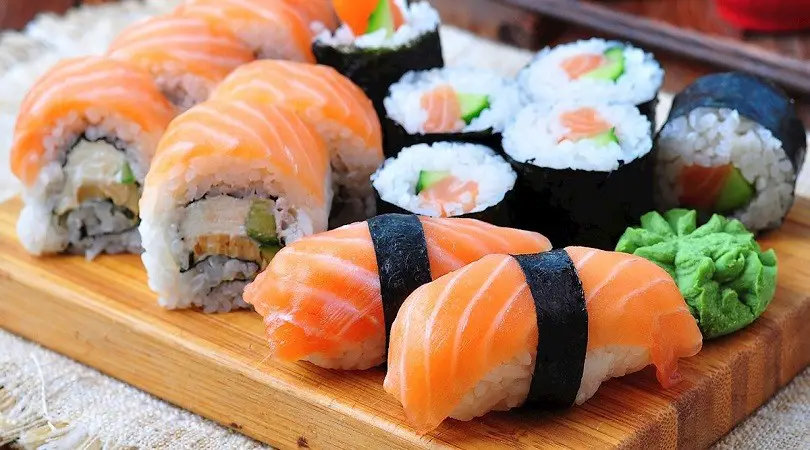Last Updated on January 6, 2025
Yes, you can eat sushi while pregnant, but it’s important to take precautions due to the risk of certain bacteria. Sushi can be a healthy choice during pregnancy if you choose cooked or vegetarian options to avoid raw fish, which may contain harmful bacteria like listeria and mercury.
Eating sushi from reputable and hygienic restaurants, as well as avoiding high-mercury fish like shark, king mackerel, and swordfish, can help ensure safe consumption during pregnancy. Additionally, it’s advisable to consult with your healthcare provider for personalized advice based on your individual health and pregnancy conditions.

Is It Safe To Consume Sushi While Pregnant?
Sushi consumption during pregnancy should be approached with caution due to potential risks from bacteria and parasites that can contaminate raw fish. It is advisable to opt for cooked or vegetarian sushi options to ensure safety for both mother and baby.
Sushi is a popular choice for many people when dining out, but what about pregnant women? Is it safe for them to consume sushi during pregnancy? Let’s explore the potential risks and concerns associated with eating sushi while pregnant, as well as expert opinions and recommendations.
Potential Risks And Concerns:
- Raw Fish: One of the main concerns with eating sushi during pregnancy is the risk of consuming raw fish. Raw or undercooked fish can potentially contain harmful bacteria or parasites, such as salmonella or listeria, that can cause foodborne illnesses and lead to complications for both the mother and the baby. These complications include dehydration, preterm labor, and even miscarriage.
- Mercury Content: Another concern is the mercury content in certain fish, such as tuna or swordfish, which may be present in sushi. High mercury levels can be harmful to the developing nervous system of the fetus, leading to developmental issues. It is important for pregnant women to limit their exposure to high-mercury fish.
- Cross-Contamination: Sushi is often prepared in establishments where different types of fish and seafood are handled. There is a risk of cross-contamination between raw fish and cooked ingredients, which can lead to the consumption of harmful bacteria or parasites. Pregnant women are particularly vulnerable to foodborne illnesses due to the changes in their immune systems during pregnancy.
Expert Opinions And Recommendations:
- The American Pregnancy Association suggests that pregnant women should avoid eating sushi made from raw fish altogether, including traditional favorites like sashimi or nigiri. It is best to opt for cooked alternatives, such as fully-cooked rolls or vegetarian options.
- The Food and Drug Administration (FDA) advises pregnant women to avoid high-mercury fish, including certain types commonly used in sushi, like fresh or frozen tuna, mackerel, shark, and swordfish. Instead, they recommend choosing fish with low mercury levels, like salmon or shrimp.
- Cooking the fish thoroughly can help eliminate potential risks associated with raw fish. If you’re a sushi lover, consider making your own at home with cooked seafood or vegetables to ensure its safety.
- It’s essential to inform your healthcare provider about your dietary choices, including sushi consumption, during pregnancy. They can provide personalized recommendations based on your specific circumstances.
Remember, the health and well-being of both the mother and the baby should be the top priority during pregnancy. So, while the sushi cravings may be strong, it is important to consider the potential risks and make informed choices to ensure a safe and healthy pregnancy.
The Potential Dangers
Sushi consumption during pregnancy can pose potential dangers due to the risk of foodborne illnesses from raw or undercooked fish. It’s important to understand the potential risks associated with eating sushi while pregnant and make informed choices to ensure the safety of both the mother and the baby.
Sushi is a popular Japanese delicacy enjoyed by millions of people around the world. However, when you’re pregnant, there are certain risks associated with eating sushi that you need to be aware of. Understanding these potential dangers can help you make informed choices about whether or not it’s safe for you to indulge in this culinary delight during pregnancy.
In this section, we will explore the key risks associated with consuming sushi when you’re pregnant.
High Levels Of Mercury In Certain Fish:
- Some fish used in sushi, such as tuna, swordfish, and king mackerel, are known to contain high levels of mercury.
- Mercury is a toxic substance that can harm the developing nervous system of a fetus.
- High levels of mercury can lead to developmental delays and brain damage in babies.
- It is recommended to limit or avoid consuming these high-mercury fish during pregnancy to minimize the risk to your baby’s health.
Risk Of Foodborne Illness From Raw Fish:
- Raw fish used in sushi can carry harmful bacteria and viruses that can cause foodborne illnesses such as Salmonella and Listeria.
- These infections can pose a serious risk to both the mother and the baby, potentially leading to complications such as premature birth or miscarriage.
- Pregnant women have a weakened immune system, making them more susceptible to contracting these foodborne illnesses.
- To reduce the risk, it is advisable to opt for cooked sushi or vegetarian options instead.
Parasite Infection Risks:
- Raw fish used in sushi can contain parasites, such as tapeworms and roundworms, which can be harmful to the fetus.
- These parasites can cause serious health issues, including malnutrition, anemia, and impaired organ function.
- Freezing fish at temperatures below -20°C (-4°F) for a minimum of 7 days kills most parasites and reduces the risk of infection.
- However, not all sushi establishments follow this practice, so it’s essential to ensure you’re consuming sushi from a reputable and trusted source if you choose to eat it during pregnancy.
While sushi can be a delightful treat, it’s important to understand the potential dangers associated with consuming it during pregnancy. The high levels of mercury in certain fish, the risk of foodborne illness from raw fish, and the potential for parasite infections are significant concerns.
To prioritize the safety of you and your baby, opting for cooked sushi or vegetarian options and choosing reputable sources are wise choices.

Safe Sushi Consumption Tips For Expectant Mothers
Are you an expectant mother wondering if sushi is safe to eat during pregnancy? Here are some helpful tips to ensure a safe sushi consumption experience for moms-to-be.
Sushi is a beloved delicacy that many pregnant women wonder if they can still enjoy. While there are certain considerations to keep in mind, the good news is that you can indeed indulge in sushi during pregnancy. By following these safe sushi consumption tips, you can satisfy your sushi cravings while ensuring the health and well-being of you and your baby.
Choosing Sushi Options That Are Safe For Pregnancy:
- Opt for cooked sushi: When dining out or ordering sushi, choose options that are fully cooked, such as cooked rolls or tempura. This eliminates the risk of consuming raw fish, which may contain harmful bacteria or parasites.
- Select vegetarian options: Vegetarian sushi rolls, such as avocado rolls or cucumber rolls, provide a nutritious and safe alternative during pregnancy. They are free from raw fish and still offer a delicious sushi experience.
- Avoid high-mercury fish: Certain fish, such as king mackerel, shark, and tilefish, are known to have higher levels of mercury. It’s best to avoid these types of fish during pregnancy as high mercury intake can be harmful to the developing fetus.
Properly Handling And Preparing Sushi At Home:
- Use fresh ingredients: If you decide to prepare sushi at home, make sure to use fresh ingredients from reliable sources. Freshness is key to minimizing the risk of bacterial contamination.
- Freeze fish: If you prefer to use raw fish in your homemade sushi, freeze it first. This process helps kill any potential parasites that may be present, ensuring your sushi is safe to consume.
- Practice good hygiene: Wash your hands thoroughly before handling any sushi ingredients. Additionally, clean all utensils, cutting boards, and surfaces to prevent cross-contamination.
Restaurant Considerations And Best Practices:
- Choose reputable sushi establishments: When dining out for sushi, opt for restaurants with a reputation for high food hygiene standards. Check online reviews and ask for recommendations from friends or healthcare professionals.
- Inquire about sushi preparation: Don’t hesitate to ask the restaurant staff about their sushi preparation methods. Ensure that they follow proper food safety practices, including appropriate storage, handling, and use of fresh ingredients.
- Avoid all-you-can-eat sushi: While all-you-can-eat sushi may seem tempting, it’s best to avoid such establishments during pregnancy. The high turnover of sushi at these places increases the risk of improper handling or inadequate refrigeration, potentially leading to foodborne illnesses.
By adhering to these safe sushi consumption tips, you can relish the joys of sushi during pregnancy without compromising your well-being. Remember to consult with your healthcare provider if you have any concerns or specific dietary restrictions during this special time.
Frequently Asked Questions
What Kind Of Sushi Can I Eat While Pregnant?
You can safely eat cooked sushi rolls during pregnancy, but avoid raw or undercooked fish.
Is It Safe To Eat Raw Sushi While Pregnant?
Raw sushi should be avoided during pregnancy as it may increase the risk of foodborne illnesses.
Do Japanese Eat Raw Sushi While Pregnant?
Pregnant Japanese people can eat raw sushi, but they should avoid high-mercury fish.
What Is The Safest Sushi To Eat?
The safest sushi to eat is cooked sushi like smoked salmon or vegetable rolls.
Can You Eat Sushi While Pregnant?
Yes, pregnant women can eat sushi, but they need to consider certain factors like the type of fish and potential foodborne illnesses.
Conclusion
While sushi is a delicious and popular food, pregnant women need to be cautious about consuming it. Raw fish and certain ingredients used in sushi can pose a risk to both the mother and the developing fetus.
It is best to opt for cooked sushi or vegetarian options to minimize the risk of foodborne illnesses. By thoroughly researching the restaurant’s food safety practices and ensuring fresh ingredients are used, pregnant women can still enjoy sushi safely. It is always recommended to consult with a healthcare professional before making any dietary choices during pregnancy.
Prioritizing the health and well-being of both the mother and the baby is crucial, and making informed decisions about food consumption is an important part of that process. So, yes, you can eat sushi while pregnant, but with caution and adherence to safety guidelines.











